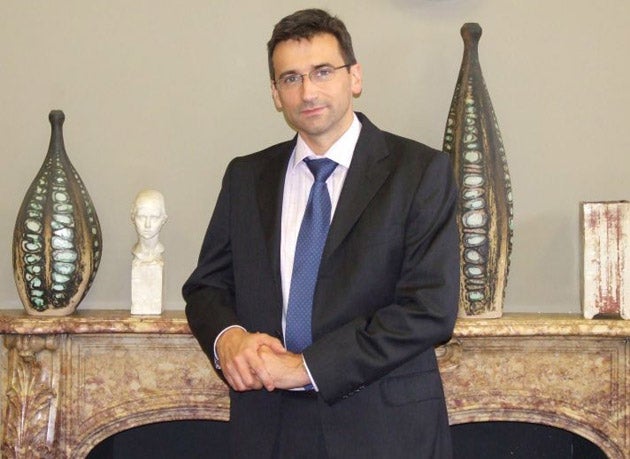'Erasmus changed my life'
A student exchange brought Kingston's dean to Britain, and he's not looked back

There is a certain grandeur in saying "Erasmus changed my life". True, Professor Jean-Noël Ezingeard is praising the EU's Erasmus student exchange programme rather than the great man of letters. But by bringing Ezingeard to Britain from France 20 years ago, the scheme opened up an academic career through which he has become dean of business and law at Kingston University London – and a passionate Anglophile.
It might have been different. Ezingeard's background did not point to an academic life. A slim, neat figure with a ready grin and quick conversational intelligence, he comes from Saint-Jean-en-Royans, a small town between Valence and Grenoble in south-eastern France. His parents had a food processing business and did not go to university.
But in some ways, his upbringing was good preparation. "I've always been interested in business. I've always been interested in management. I was sort of bathed in it as a baby," he says. Around the time he was taking his Baccalauréat, Ezingeard realised he wanted to be an academic. Despite it being an unfamiliar world, he found the idea of academic life attractive.
He travelled north to study engineering science at the École Centrale de Lille, one of the engineering grandes écoles. Lille was a big contrast to his home terroir, but he loved it. The undergraduate degree involved a lot of traditional learning and aroused an enduring interest in operations management and information systems.
In the final year of his studies, he went to Brunel University on the Erasmus programme. It was not his first visit to Britain. While at school, Ezingeard had done an exchange with an English pen friend which took him to a council estate in Dartford. "That was probably quite life-changing because I came from rural France," he says.
Brunel was a more serious proposition. "My English was pretty poor. I could follow lectures. Socially, I was left out. I tried to mingle, but people were speaking too fast." But, as if in compensation, Ezingeard took to Brunel academically like a duck to water, starting a Masters degree in advanced manufacturing systems. He found the relative freedom of the British approach stimulating, and particularly enjoyed writing a dissertation. "The change of pedagogy suited me very well. I thought, this is a good way of developing people."
Soon after arriving at Brunel in 1990, he started teaching part-time. The university taught some courses in French as part of the Erasmus programme, helping Brunel students to study in France. Ezingeard recalls: "I taught them maths and systems engineering in French and then computer integrated manufacturing in French."
With the Masters degree under his belt, Ezingeard embarked on a PhD on performance evaluation techniques for information systems. Before it was awarded in 1996, however, Brunel appointed him to a lectureship. "That's why I like the UK system. It gave me those opportunities and there was flexibility to appoint me."
At Brunel, he ran the special engineering programme and is full of admiration for the university. "It's a wonderful engineering school," he says. But the attraction of academic management was growing. Management systems were a logical move from information systems. It was also a desire to experience more of management at first hand. "I wanted to get closer to managers and to work with them. I began to feel lonely among the engineers. They were hugely impressive engineering brains. But there was something missing."
In 1998, he moved to the then Henley Management College, now merged into the Henley Business School at the University of Reading. There he rejoiced in the titles professor of processes and systems management and academic dean. "It was very much about the intellectual agenda of the school. I didn't have to worry about recruitment. I didn't have to worry about student finance," he says.
Looking back, the Henley job turned out to be good preparation for Kingston, which he joined two years ago. The experience helped Ezingeard to understand himself as a manager and amplified the realities behind what he had taught. The interaction of theory and practice has helped with a book he is writing. "When I get stuck for an idea, I go back to my experience as a manager. I find that very helpful in terms of unlocking myself in the thinking process. I ask: 'What would that mean for a manager in practice?'"
Such ideas are about to be put to the test. Kingston plans to have a new business school building ready for the 2013 intake, although Ezingeard does not plan to increase the number of MBA students much beyond the present 38 taking the degree full time and 25 part time. He also intends to keep business and law in the same faculty, arguing that there is valuable overlap in areas such as environmental law.
However, Ezingeard is interested in expanding the school's services to industry, perhaps by providing more consulting services to companies and even undertaking commissioned research. He accepts conflicts of interest may arise, but says theory and practice must stay connected. "Working with clever people is what this job is about. But a good business school should be about research grounded in organisations."
There are also plans to expand the school's overseas interests, notably in India.
So what about his own future? His partner is British, and Ezingeard waxes lyrical about Britain: "I love the place. I love Kingston. I love the south-east of England. I love London. If I moved back to France, it would be for a special job. But the next move is not on the horizon yet." Erasmus should be pleased.
Join our commenting forum
Join thought-provoking conversations, follow other Independent readers and see their replies
Comments
Bookmark popover
Removed from bookmarks